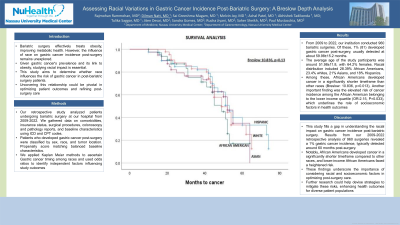Monday Poster Session
Category: Stomach
P2717 - Assessing Racial Variations in Gastric Cancer Incidence Post-Bariatric Surgery: A Breslow Depth Analysis
Monday, October 23, 2023
10:30 AM - 4:15 PM PT
Location: Exhibit Hall

Presenting Author(s)
Rajmohan Rammohan, MD, Tulika Saggar, MD, Melvin Joy, MD, Dilman Natt, MD, Sai Greeshma Magam, MD, Achal Patel, MD, Abhishek Tadikonda, MD, Jiten Desai, MD, Sandra Gomez, MD, Rucha Jiyani, MD, Saher Sheikh, MD, Paul Mustacchia, MD, MBA
Nassau University Medical Center, East Meadow, NY
Introduction: Bariatric surgery effectively treats obesity, improving metabolic health. However, the influence of race on gastric cancer incidence post-surgery remains unexplored. Given gastric cancer's prevalence and its link to obesity, studying racial impact is essential. This study aims to determine whether race influences the risk of gastric cancer in post-bariatric surgery patients. Uncovering this relationship could be pivotal in optimizing patient outcomes and refining post-surgery care
Methods: Our retrospective study analyzed patients undergoing bariatric surgery at our hospital from 2009-2022. We gathered data on comorbidities, insurance status, surgical procedures, colonoscopy and pathology reports, and baseline characteristics using ICD and CPT codes. Patients who developed gastric cancer post-surgery were classified by sex, race, and tumor location. Propensity score matching balanced baseline characteristics. We applied Kaplan Meier methods to ascertain Gastric cancer timing among races and used odds ratios to identify independent factors influencing study outcomes
Results: From 2009 to 2022, our institution conducted 960 bariatric surgeries. Of these, 1% (81) developed gastric cancer post-surgery, usually detected at about 59.98±15.2 months. The average age of the study participants was around 51.98±11.8, with 64.2% females. Racial distribution included 28.39% African Americans, 23.4% whites, 21% Asians, and 18% Hispanics. Among these, African Americans developed cancer in a significantly shorter timeframe than other races (Breslow: 10.836, p=0.013), Another important finding was the elevated risk of cancer incidence among the African American belonging to the lower income quartile (OR:2.15, P=0.033), which underlines the role of socioeconomic factors in health outcomes
Discussion: This study fills a gap in understanding the racial impact on gastric cancer incidence post-bariatric surgery. Results from our 2009-2022 retrospective analysis of 960 surgeries revealed a 1% gastric cancer incidence, typically detected around 60 months post-surgery. Notably, African Americans developed cancer in a significantly shorter timeframe compared to other races, and lower-income African Americans faced a heightened risk. These findings underscore the importance of considering racial and socioeconomic factors in optimizing post-surgery care. Further research could help devise strategies to mitigate these risks, enhancing health outcomes for diverse patient populations

Disclosures:
Rajmohan Rammohan, MD, Tulika Saggar, MD, Melvin Joy, MD, Dilman Natt, MD, Sai Greeshma Magam, MD, Achal Patel, MD, Abhishek Tadikonda, MD, Jiten Desai, MD, Sandra Gomez, MD, Rucha Jiyani, MD, Saher Sheikh, MD, Paul Mustacchia, MD, MBA. P2717 - Assessing Racial Variations in Gastric Cancer Incidence Post-Bariatric Surgery: A Breslow Depth Analysis, ACG 2023 Annual Scientific Meeting Abstracts. Vancouver, BC, Canada: American College of Gastroenterology.
Nassau University Medical Center, East Meadow, NY
Introduction: Bariatric surgery effectively treats obesity, improving metabolic health. However, the influence of race on gastric cancer incidence post-surgery remains unexplored. Given gastric cancer's prevalence and its link to obesity, studying racial impact is essential. This study aims to determine whether race influences the risk of gastric cancer in post-bariatric surgery patients. Uncovering this relationship could be pivotal in optimizing patient outcomes and refining post-surgery care
Methods: Our retrospective study analyzed patients undergoing bariatric surgery at our hospital from 2009-2022. We gathered data on comorbidities, insurance status, surgical procedures, colonoscopy and pathology reports, and baseline characteristics using ICD and CPT codes. Patients who developed gastric cancer post-surgery were classified by sex, race, and tumor location. Propensity score matching balanced baseline characteristics. We applied Kaplan Meier methods to ascertain Gastric cancer timing among races and used odds ratios to identify independent factors influencing study outcomes
Results: From 2009 to 2022, our institution conducted 960 bariatric surgeries. Of these, 1% (81) developed gastric cancer post-surgery, usually detected at about 59.98±15.2 months. The average age of the study participants was around 51.98±11.8, with 64.2% females. Racial distribution included 28.39% African Americans, 23.4% whites, 21% Asians, and 18% Hispanics. Among these, African Americans developed cancer in a significantly shorter timeframe than other races (Breslow: 10.836, p=0.013), Another important finding was the elevated risk of cancer incidence among the African American belonging to the lower income quartile (OR:2.15, P=0.033), which underlines the role of socioeconomic factors in health outcomes
Discussion: This study fills a gap in understanding the racial impact on gastric cancer incidence post-bariatric surgery. Results from our 2009-2022 retrospective analysis of 960 surgeries revealed a 1% gastric cancer incidence, typically detected around 60 months post-surgery. Notably, African Americans developed cancer in a significantly shorter timeframe compared to other races, and lower-income African Americans faced a heightened risk. These findings underscore the importance of considering racial and socioeconomic factors in optimizing post-surgery care. Further research could help devise strategies to mitigate these risks, enhancing health outcomes for diverse patient populations

Figure: Breslow analysis of the impact of Race in post-bariatric Gastric cancer patients
Disclosures:
Rajmohan Rammohan indicated no relevant financial relationships.
Tulika Saggar indicated no relevant financial relationships.
Melvin Joy indicated no relevant financial relationships.
Dilman Natt indicated no relevant financial relationships.
Sai Greeshma Magam indicated no relevant financial relationships.
Achal Patel indicated no relevant financial relationships.
Abhishek Tadikonda indicated no relevant financial relationships.
Jiten Desai indicated no relevant financial relationships.
Sandra Gomez indicated no relevant financial relationships.
Rucha Jiyani indicated no relevant financial relationships.
Saher Sheikh indicated no relevant financial relationships.
Paul Mustacchia indicated no relevant financial relationships.
Rajmohan Rammohan, MD, Tulika Saggar, MD, Melvin Joy, MD, Dilman Natt, MD, Sai Greeshma Magam, MD, Achal Patel, MD, Abhishek Tadikonda, MD, Jiten Desai, MD, Sandra Gomez, MD, Rucha Jiyani, MD, Saher Sheikh, MD, Paul Mustacchia, MD, MBA. P2717 - Assessing Racial Variations in Gastric Cancer Incidence Post-Bariatric Surgery: A Breslow Depth Analysis, ACG 2023 Annual Scientific Meeting Abstracts. Vancouver, BC, Canada: American College of Gastroenterology.

